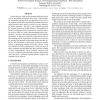Free Online Productivity Tools
i2Speak
i2Symbol
i2OCR
iTex2Img
iWeb2Print
iWeb2Shot
i2Type
iPdf2Split
iPdf2Merge
i2Bopomofo
i2Arabic
i2Style
i2Image
i2PDF
iLatex2Rtf
Sci2ools
SEKE
2004
Springer
2004
Springer
Automated Assistance for Eliciting User Expectations
People often use software for mundane tasks and expect it to be dependable enough for their needs. Unfortunately, the incomplete and imprecise specifications of such everyday software inhibit many dependability enhancement techniques because these require a model of proper behavior for failure detection. We offer a user-centered approach for creating a model of proper behavior. This approach is based on satisfying the user expectations—software behavior the user relies on—rather than demanding perfect specifications. It utilizes data mining through a novel template mechanism, to help users make their expectations precise. The resulting precise expectations can then serve as proxies for missing specifications in detecting unexpected data behavior. We concentrate on data feeds: continuous streams of data, a challenging example of everyday software. Using our method on a real world data feed, it took just hours to detect problems that had taken the data providers months to detect ...
| Added | 02 Jul 2010 |
| Updated | 02 Jul 2010 |
| Type | Conference |
| Year | 2004 |
| Where | SEKE |
| Authors | Orna Raz, Rebecca B. Buchheit, Mary Shaw, Philip Koopman, Christos Faloutsos |
Comments (0)

